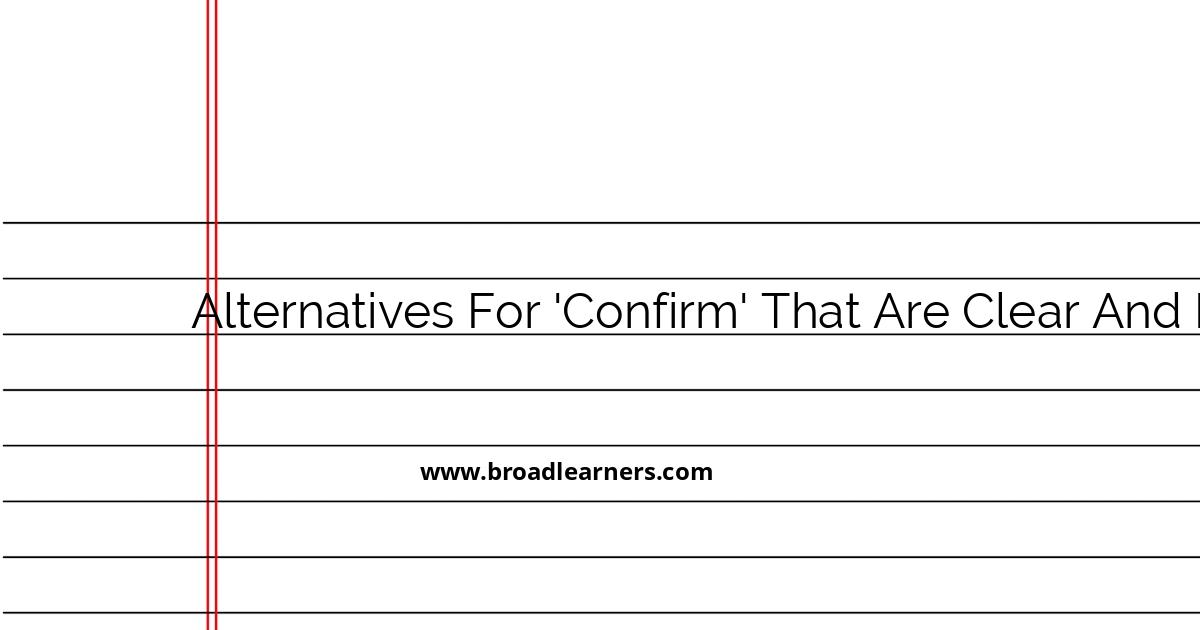In professional communication, it's essential to use language that is both clear and polite. The word 'confirm' is often used in emails and other communications to ask someone to verify or validate information. However, there are many ways to express this request that can be more nuanced or better suited to the context. In this article, we'll explore 10 polite alternatives to 'confirm' that can be used to enhance clarity and professionalism:
- Verify
- Validate
- Authenticate
- Corroborate
- Substantiate
- Reaffirm
- Assure
- Acknowledge
- Reconfirm
- Endorse
Now let's explore each alternative in more detail:
1. Verify
To 'verify' means to check the accuracy of something. This term is commonly used in situations where confirmation of facts or data is necessary. It is both clear and formal, making it suitable for professional settings.
Example:
Dear Martin,
Could you please verify that the meeting is scheduled for 3 PM on Friday? Thank you for your cooperation.
Best regards,
Emma
2. Validate
The word 'validate' implies checking the truthfulness or legitimacy of something. It is particularly useful when discussing processes, procedures, or documents that need confirmation.
Example:
Hi Laura,
Can you validate the findings of the latest report? Your confirmation is essential for our upcoming presentation.
Warm regards,
James
3. Authenticate
To 'authenticate' means to establish as genuine. It is often used in contexts involving security or identity verification, adding a layer of trust to the communication.
Example:
Dear Alex,
Please authenticate the user credentials before proceeding with the transaction. Thank you for ensuring our system's security.
Regards,
Alice
4. Corroborate
The term 'corroborate' refers to strengthening or supporting a statement, theory, or finding with additional evidence. It is ideal when you need more than just verbal confirmation.
Example:
Hi Zoe,
Could you help corroborate the data presented in the financial summary? Additional details would be greatly appreciated.
Cheers,
Max
5. Substantiate
'Substantiate' indicates providing solid evidence to support a claim or statement. It's best used when a thorough verification backed with facts is required.
Example:
Dear Ralph,
I would appreciate it if you could substantiate the assumptions outlined in the proposal. Your insights are always valuable.
Sincerely,
Olivia
6. Reaffirm
'Reaffirm' means to confirm again or reinforce something already established. It is suitable for situations where a previous agreement or belief needs to be reinforced.
Example:
Hello Jim,
Can you please reaffirm your commitment to the project's timeline? Reassurance would help keep everyone aligned.
Thanks,
Betty
7. Assure
To 'assure' involves removing doubt or reassuring someone about a particular matter. It conveys confidence and support.
Example:
Dear Monica,
Could you assure the team that the tools are ready for deployment by Monday? Your assurance is crucial to our schedule.
Best,
Tom
8. Acknowledge
'Acknowledge' involves accepting or recognizing something to be true. This term is often used to express acceptance of information received.
Example:
Hi Lisa,
Please acknowledge receipt of the document at your earliest convenience. Thank you!
Kind regards,
Greg
9. Reconfirm
'Reconfirm' is used when there's a need to check again after an initial confirmation. It ensures that the previous information is still valid and up-to-date.
Example:
Dear Chris,
Could you reconfirm the dates for the training session? Ensuring alignment is vital for everyone involved.
Warm wishes,
Susan
10. Endorse
'Endorse' refers to giving support or approval. It is often used for recommendations or decisions that require backing.
Example:
Hi Daniel,
If possible, could you endorse the plan as discussed in our last meeting? Your endorsement would mean a lot for the project's progression.
Best wishes,
Samantha
These 10 alternatives to 'confirm' can help you communicate more effectively and professionally. By selecting the most appropriate term for your context, you can impart clarity and politeness to your requests.

Did I miss anything? Respond below